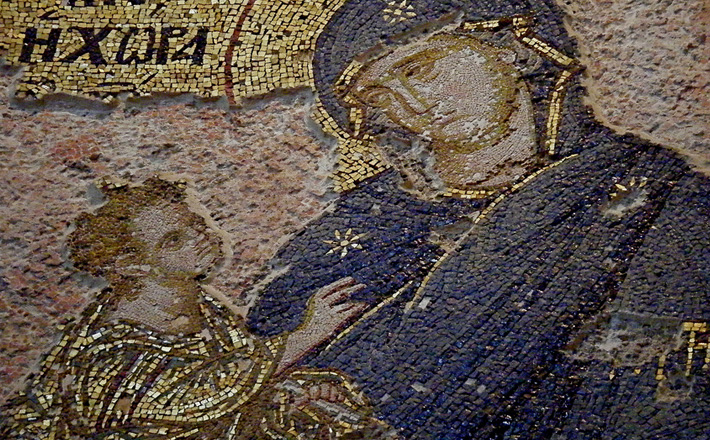Commentary on Isaiah 9:2-7
The NORAD website allows you to track Santa’s progress across the world on Christmas Eve.
As the earth spins, the swath of perpetual shadow from the sun moves over all of the earth’s countries and people. But “the land of deep darkness” in Isaiah 9:2 does not refer to night.
“Darkness” is not a daily or even yearly phase in a routine cycle. The land of deep darkness cannot be penetrated by an annual ritual. In Isaiah, the land of deep darkness bespeaks a period of history marked by political oppression. People buckle under a nation-wide yoke. Multiples of lives lived in gloom and anguish are perceived together by Isaiah.
The light that shines on the people is a once-in-a-life-time salvation event for the entire collective. So what about Christmas? Can Christmas slough off the individual chimneys of Santa’s annual gifts and take on the once-in-a-life-time challenges we face as we look with Christ at a world filled with historical oppressions?
Grooming Royal Vision for Peace
Isaiah 9:2-7 is an accession oracle for a new king. The festive spirit at the beginning of the oracle celebrates the end of Assyrian oppression and the destruction of enemies in war. These conditions make possible the coronation of a native king in Judah.
In the ancient Near East, a royal birth was always an occasion for celebration and renewal. However, Isaiah’s is a native movement celebrating a unique and politically propitious moment in their history. The sense of renewal was no doubt compounded by the infancy of the new ruler, who could be groomed to embody the high hopes of Judeans. The titles in verse 6 form almost a curriculum in royal Judean values. These attributes equip the new king for his responsibility to oversee a just and righteous kingdom.
Within his curriculum, the new king will be groomed as the “prince of peace.” His peace-curriculum will include training in how to bring completeness, wellbeing, and welfare to his people. Peace (shalom) is a societal concept, one that binds people together in a life of hopeful prosperity. The Assyrian yoke had destroyed this kind of peace.
Historical Context of War and Politics
I don’t think people appreciate the warfare out of which Isaiah’s oracles grew. Even the lectionary text points to its significance. Verse 5 promises that “all the boots of the trampling warriors and all the garments rolled in blood shall be burned as fuel.” The tone of celebration when the people see the “great light” is analogous to “people [who] exult when dividing plunder” (verse 3).
It was more than a century of almost incessant violence. The prose introduction in 9:1 sets this oracle in between two phases of warfare and political ruin for Israel, Judah’s neighbor in the north. The “former time” refers to local wars over the contested land between Israel and Syria. In the “latter time,” the same disputed lands were forcefully seized and made provinces of the Assyrian empire.
Throughout both of these periods of warfare, Judah was sporadically brought into the fray. The royal figure in Isaiah 9 is usually thought to be Hezekiah (715-687 BCE), whose royal predecessor (Ahaz) willingly formed an alliance with Assyria. This brought Judah into the Assyrian military-economic system, which Isaiah refers to as the “yoke of their burden” (verse 4).
A “yoke” was one of the most common ways for expansionist kingdoms to describe their relationship of power and oppression to the lands they take under their system. Numerous Assyrian royal inscriptions brag about the number of provinces under the yoke of the king. It is a triumphalist term to describe Assyrian domination.
Though war is always filled with death and destruction, the “latter time” or the second phase of violence was more insidious than the first. The Assyrians did not just fight wars. They used war to maintain the system of tribute. The Assyrian vassals/provinces had two choices: (1) devout obedience to Assyria’s heavy, erratic, and threatening economic program or (2) revolt against the vastly more powerful military-economic dominance of Assyria. Either way, the Assyrians yoked their vassals in a system that usurped wealth and exerted power through the terror of war.
Life under the Yoke: The Metaphor of Darkness Extended
An earlier reference to darkness in the immediate context of our passage brings greater understanding to the degraded conditions of everyday life in Judah while under the Assyrian yoke. Isaiah 8:19-22 describes one man’s search for some advice or clarity from divine spirits. No doubt, his life in a society yoked to the Assyrians left him without his farm or with his vines stripped of fruit. His turn to necromancy brings only “distress and darkness with no daybreaks” (verse 22). His necromancy and its consequences serve as a negative example for everyone living under the yoke.
Isaiah uses this one man’s experience as a proxy for the darkness that sets in over everyone. Because of the plural address in verse 19, we are led to imagine a land filled with people like him on restless and frustrated searches, searches perhaps pragmatic, perhaps spiritual, but no doubt driven by the difficult conditions of life. Whether he looks up or down, darkness is the only reality he can see (8:22). This dark shadow falls over everyone living in the “land in straits” (verse 23). Everyone suffers a degraded existence on the underside of the Assyrian yoke.
Isaiah is doing some profound thinking with this man’s experience. Reflecting on how the yoke and the land in straits affects the human condition, Isaiah states, “he will go about wretched and hungry; and when he is hungry, he shall rage and revolt against his king and his divine beings” (verse 21). Poverty and hunger change a person. Hunger breeds rage. The eyes see red.
The impoverished life under the yoke breeds a hermeneutic of revolt. Coupled with rage, Isaiah diagnoses a problem he sees in society: that people revolt against proxy culprits. People under the yoke misinterpret the forces at work in their lives, through bad information, ignorance, or impatience. To be clear, Isaiah sees life under the yoke as a network of injustice that creates enemies among neighbors, catalyzes conflict instead of cooperation, and intensifies boundaries that separate difference. Life under the yoke has everyone seeing red.
The Royal Vision for Peace
While he hopes that the one everyday man will be able to overcome his hermeneutic of revolt, Isaiah’s message of salvation is broader sweeping than this. Isaiah’s real solution lies in a society greatly transformed. The prophet shows what it could mean for everyone if the yoke that makes hungry were broken.
This is not individual salvation. This is a collective political vision for an entire people, rescued from the oppressive Assyrian yoke of usurpation, domination, and the fear of terror. The politics of oppression will be broken. The economics of usurpation will no longer warp the world. Adopting Isaiah’s royal vision, those schooled in peace will knit the fabric of society back together so that hunger and rage and revolt are quelled.
The people who walked in darkness
Have seen a great light
Those who lived in a land of deep darkness
On them light has shined.


December 24, 2013